Singer/songwriter/guitarist Tom Johnston is a founding member of The Doobie Brothers, and wrote a number of their best-known songs including “Listen to the Music”, “China Grove”, “Rockin’ Down the Highway”, and “Long Train Runnin'”. He also sang the band’s hit cover song “Take Me in Your Arms”.
Johnston’s role in the band was reduced in the mid-70’s while he recovered from a stomach ulcer, and he eventually left the band. However, when they re-formed in 1987 he was back in the game, and he has stayed with The Doobie Brothers ever since.
This interview was for a preview article for The Doobie Brothers concert on 7/25/14 at the California Mid-State Fair in Paso Robles. It was done by phone on 7/3/14.
Jeff Moehlis: What can we look forward to at the upcoming show?
Tom Johnston: You’ll be catching the full-boat show that we put on. It covers all eras of the band, from the front to the back. That includes the last album that we put out in 2010, which is World Gone Crazy. We’re doing a couple of songs off that. It’s a high energy show. It’s been going over very well everywhere we’ve played. We’ve been on the road the summer with Peter Frampton, and still are, and Boston. But we’re also doing quite a few shows on our own, and this will be one of them.
So we’ve been very busy. This doesn’t have to do with the live show, but we just finished up an album with a bunch of country artists. It’s something new that we’ve never tried before. It was an idea that was brought to us by Sony Records, and the producer who is named David Huff. He said, “What would you guys think of redoing the hits, re-tracking the hits and doing them with country artists?” It’s something that we never even thought about. We said that might be a lot of fun. It could be a very cool idea.
So we did that, and the album is done. It’ll be out in November. The name of it is Southbound, and it has artists like Blake Shelton, Brad Paisley, Zac Brown, Toby Keith, Chris Young, Sara Evans, some new guys like Love and Theft, Charlie Worsham, Casey James, some people playing on it who have been around the business for quite a while like Vince Gill, Dann Huff who is a major producer and an incredible guitar player, Hunter Hayes who actually is also another fairly new artist, he’s on there as well playing guitar, and then us. So what you’ve got is a collaborative effect. And also Michael McDonald is on this as well. He has three songs on it. So you have basically all eras of the band represented, and you’ve got an across-the-board selection of really great country artists involved with the songs.
JM: Sounds cool. Did that give you a new perspective on The Doobie Brothers’ songs?
TJ: Yeah, the thing that I think I learned most about this, and had no idea, was how much the band has influenced so many people in country music. I had no idea. When I say “influenced”, I mean that they grew up listening to the band and they’re familiar with the songs, and appreciate the band, they like the band. And they were great to work with, just some really good people. That also goes for the studio guys that we cut basically all of the tracks with. Incredible players, really a pleasure to work with, and super, super good.
JM: I want to ask you a question going way, way back. It’s cool that Skip Spence played a role in The Doobie Brothers coming together. Can you tell me a little bit about how that all worked out?
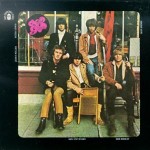
TJ: Yeah, I’d be glad to. I met Skip when I first moved up to San Jose. My sister knew him, and I’m not even sure why. So that was probably ’68, ’69. I met Skip and we ended up playing music together, and he introduced me to [future Doobie Brothers drummer] John Hartman who had moved out from D.C. along with a bass player named Greg Murphy in search of anybody from Moby Grape at that time, which is who Skip is mostly associated with, even though he did play on Jefferson Airplane’s first album as a drummer and then later as a guitar player for Moby Grape.
We played in bands with Skip – when I say “we”, I mean John Hartman and myself, and the bass player would change out. We had a quartet that we would do every once in a while, and that’s how we ran into Pat Simmons. One night we were playing with Skip, and Pat was on the bill. We watched him play and really enjoyed his playing and his fingerpicking style, which is something that nobody else in our gang of guys was doing. He also was a Moby Grape fan. So Skip was kind of instrumental in his own way, without him meaning to. It was an organic thing, if you will, in getting the band to meet each other. We invited Pat over, he came over and jammed at that 12th Street house, and joined the band. We put a band together, and that was the very beginnings of the band The Doobie Brothers. And then we continued from there.
Skip got us recording time at a studio that doesn’t exist anymore called Pacific Studios in San Mateo, and that’s where we recorded our first demo. And that demo is what got us signed to Warner Brothers. So Skip was very involved in a lot of ways.
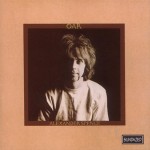
JM: There are some legendary stories about Skip’s mental health. Was he doing pretty well at that time?
TJ: Well, he was very colorful [laughs]. I never met anybody before or since like Skip. Yeah, I believe he had some problems with mental issues and what have you, and he had them before I ever met him. But he was still really with it and musically viable, and I really enjoyed the time I got to spend with him making music. I was around to watch the reformation for the brief amount of time that it lasted of Moby Grape, during that period of time. All the way around, it was all part of a learning experience. I learned a great deal from hanging around Skip.
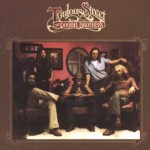
JM: Things really took off for The Doobie Brothers with the song “Listen to the Music”. Can you tell me a little bit about the origins of that song?
TJ: It was just another one of those late night sessions with myself in my room on 12th Street, on acoustic guitar just playing and playing and playing. I came up with an idea for some chord changes, and put those together and wrote the words out, which is something I didn’t normally do. Normally it was just the chord changes and the words came later. In that particular song I wrote the words the same night as I wrote the chord changes, and the feel for it rhythmically and all that, and called our producer Ted Templeman at a very late hour, woke him up and played the song for him over the phone. I said, “This could be a single.” It’s the only one I’ve ever really called in my entire life.
We took it in the studio and it stayed pretty much true to what I had written, and the words stayed the same, the chord changes stayed the same, the rhythm structure was the same. It was just, of course, recorded professionally and sounded a lot better. But that’s where that song came from. The lyric ideas were basically focused on the idea of world leaders utilizing music rather than words to hash out their differences, and realizing that as humans they had a lot more in common than they thought. You get politics out of the way and just let the music do the talking, which was a very utopian ideal. Pretty unrealistic, I’m afraid. But it was a good idea at the time, it seems like.
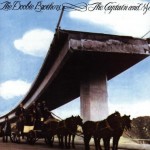
JM: My favorite Doobie Brothers song is “China Grove”. What’s the story behind that song?
TJ: That’s another one that I came up with playing on acoustic, and then I grabbed John Hartman and said, “We’ve got to go try this electric.” I said, “This is going to be a great rock ‘n’ roll song.” I didn’t pick it for a single or anything, but I said “I think this will be a great track to develop.” And we got down to the basement and just cranked it up. It was probably very late at night. I’m sure our neighbors were ready to kill us. But we went ahead and worked on it, and worked out the basics to it, if you will.
And then we got it in the studio and developed it from there, musically speaking. I didn’t write the lyrics until Billy Payne – who played on a lot of our tracks, the keyboard player from Little Feat, phenomenal keyboard player, he played on so many of our tracks for quite some time, actually, on a lot of our albums – he came up with a piano lick that was somewhat Oriental in nature, as far as the sound, and that’s why I got the idea for “China Grove”, and then the lyrics about the crazy sheriff and the samurai sword and all that sort of thing. But, in reality, when we were touring in like 1972, we were touring a Winnebago, we were driving it ourselves, and we drove right down that very road that goes into San Antonio. There’s actually a road sign that says “China Grove” and I must’ve seen it. I didn’t recall doing it, but I’m sure that it lodged into memory somewhere, and just was brought back out when I started writing the song. There really is a China Grove. There’s a couple of them, actually. There’s the one right outside San Antonio. There’s also one in, I think, North Carolina.
JM: What advice would you give to an aspiring musician?
TJ: I get asked that all the time, and because the times have changed so much the advice doesn’t… I would always tell anybody, at any given time, to practice. Get as developed as you can be at your craft, if it’s singing or if it’s playing, or if it’s both. If you’re a songwriter, write every day. If you’re a lead guitarist, practice diligently. If you’re a rhythm player and all those other players, just keep practicing. The same with vocals. Work on things like vocal exercises, which is something I never heard of back in those days. I wish I had, because they really do help, and they help you develop your voice.
Then you’ve got to face the business end of it, which nowadays is harder than it’s ever been. It’s more diverse because of the internet, and with streaming and downloading and all that sort of thing.
Getting your music out there, you could make an album… It’s a double-edged sword here, with the advent of all of the software that you can use now to record with, and I use myself to write with, not to record albums but just to write songs. It really allows you to fill out a song a great deal more. You can play the bass, you can play the drums, you can play strings, you can play horn parts, you can sing vocals into the computer, you can play guitar into the computer, you can do all that. That part of it’s great, and it’s really been a boon as far as writing and everything goes.
But because of it, a lot of the great studios that have always been the hallmark of a lot of really incredible albums have gone away, because the demand for studio time has lessened, with the ability to do that kind of recording on ProTools and what have you in your house or wherever, or in small studios around the area. You can record that, and if you’ve got enough of the modern software and plug-ins and all that sort of thing, it allows you to do a lot of stuff that used to require a studio to do. Now, I personally still love working in a real studio. There’s nothing like it. To me it’s where the best work gets done. But a lot of studios have closed as a result of the advent of a lot of these types of technical advances.
But back to your original question. Just keep at it. The business end of it, because of the internet, now you can make your own album with all of the software and things I was just describing, and you could sell on the internet. You can sell it on iTunes, you can market it on the internet. You can do everything, but you’re still going to have to find a booking agent, you’re still going to have to find a manager, you’re still going to have to do all the things that have always been the cornerstone of making a profession of this. And the competition is insane [laughs]. Way, way, way more people doing it now than it used to be.
JM: Do you have any crazy tour stories you’re willing to share from the early 70’s? Or is that better left unsaid?
TJ: Oh yeah, there was a period of time where, you know, televisions used to go flying out the window, and go-carts ended up in swimming pools, and people would have rent-a-car door wars, just a lot of crazy stuff. All of which has gone by the wayside. None of that goes on anymore. Those were all just growing pains – that’s what I look at them as. All that stuff occurred early on. Like I said, it’s gone by the wayside. People don’t do that anymore.
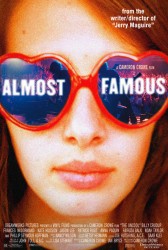 If you ever saw the movie Almost Famous, the plane scene, where the plane’s going down and everybody starts going “Oh my God!” We actually experienced that. That exact thing happened to us outside of Detroit in a really bad thunderstorm with a lot of lightning, and we lost an engine. We had an extremely good pilot. They didn’t crash and we didn’t either. But we had a very similar experience to that, so watching that movie really was like going back in time. I said, “God, I was there. That’s incredible!” That’s how we used to travel for quite a bit of time, from say ’73, ’74 through ’77 or ’78. The band traveled by plane. It was a prop job from World War II. One burned down so we replaced that one. We also had a liner to carry the crew. In the original version it was everybody, the crew and the band all traveled together in the same plane. It was pretty crazy.
If you ever saw the movie Almost Famous, the plane scene, where the plane’s going down and everybody starts going “Oh my God!” We actually experienced that. That exact thing happened to us outside of Detroit in a really bad thunderstorm with a lot of lightning, and we lost an engine. We had an extremely good pilot. They didn’t crash and we didn’t either. But we had a very similar experience to that, so watching that movie really was like going back in time. I said, “God, I was there. That’s incredible!” That’s how we used to travel for quite a bit of time, from say ’73, ’74 through ’77 or ’78. The band traveled by plane. It was a prop job from World War II. One burned down so we replaced that one. We also had a liner to carry the crew. In the original version it was everybody, the crew and the band all traveled together in the same plane. It was pretty crazy.
JM: Do you want to set the record straight on anything about your career or the band?
TJ: There isn’t really a lot of misinformation out there. As far as the band changing sounds when I left the band in ’75 due to a stomach ulcer, and I had to go to the hospital and spend some time getting that fixed… That’s when Michael [McDonald] joined the band, initially to play keyboards, and then the album that ensured, which was Taking It to the Streets, took the band in a different direction because he had this whole treasure trove of songs. A lot of people have tried to make that into a thing about Michael and I not getting along, or Michael and I going at it due to the different type of music. But that’s all complete fantasy. It never happened. We get along fine, and I have the greatest admiration for Michael. As I said, he’s on the new album, and the songs that he wrote, they ended up giving Grammys for a couple of those songs. So I think, if anything, it kind of is a compliment to the band to be able to make that big of a change and still maintain an audience, and develop a new audience.
And then to go back, as of ’87 when we got back together for that Vietnam vets benefit that Keith Knudsen got us all together for, and ended up doing 13 shows altogether, and then as a result of that our producer Ted Templeman came to the original guys and said, “What would you think about re-forming the band in its original formation, with the original guys?” And everybody at that time wasn’t doing anything really large in the music world. I’d done a couple of solo albums, Pat had done a solo album, but we all said, “Yeah, why not?” So we did. We put the band back together, then in ’89 we cut the first album which was Cycles, and then we’ve been going ever since.
JM: Where are you speaking to me from?
TJ: I’m in Northern California.
JM: Are you on break?
TJ: Yeah, we’ve got a week off. We’ve been out a lot since the very beginning of April. We were in Australia, New Zealand, and doing other gigs before that, and then we came back and did more gigs here. Then we started picking up the dates that we’re doing now with Peter Frampton and Boston, and then we’ve got a lot of other dates that we’re doing on our own as well. We have a pretty full year, with the release of another album and with the touring we’re doing. It’s busy. It hasn’t slowed down at all.

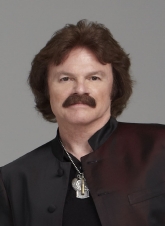
Discussion
No comments for “Interview: Tom Johnston”